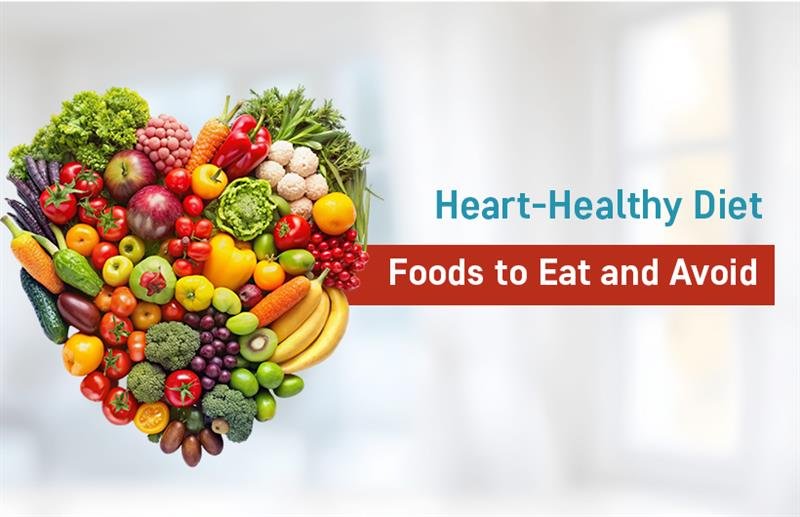Maintaining a heart-healthy diet is one of the most effective ways to prevent cardiovascular disease and ensure long-term heart care. Realising that some foods nourish your heart and that some of them silently undermine it is important for a healthier lifestyle.
Why a Heart-Healthy Diet Matters
Heart disease is one of the major ailments of death across the world. The increasing load of cardiovascular diseases in the Indian population is something crucial, especially among young populations. The choices we make to live, such as the food we consume, contribute to heart health enormously.
A healthy food plan not only reduces the chances of cardiovascular illness, but it also assists in controlling blood pressure levels, cholesterol concentrations and sugar levels as well as weight according to cardiovascular problem determinants. Whether you want to avoid heart problems or you are already recommended by a cardiologist doctor in Ahmedabad, strategic decisions concerning the Heart Healthy Diet are essential.
Best Foods to Consume for a Healthy Heart
The following are foods that have been scientifically proven to be heart beneficial and have been approved by nutritionists:
1. Leafy vegetables
- Examples: Spinach, Kale, fenugreek (Methi), amaranth
- Why it works: It is rich in vitamin K, which prevents arteries as well as aids in clotting blood in the right way. They also contain a lot of dietary nitrates, which decrease blood pressure and enhance arterial functionality.
2. Whole Grains
- Example: Brown rice, barley, quinoa, and oats
- How it works: Rich in fibre that can reduce LDL (bad) cholesterol and improve heart health.
3. Berries
- Examples: Strawberries, blueberries and raspberries
- Why it works: It contains high concentrations of antioxidants such as anthocyanins that curtail oxidative stress and inflammation.
4. Fatty Fish
- Examples: Salmon, sardines, mackerel
- Why it works: A top source of omega-3 fatty acids that lowers triglycerides, reduces blood pressure, and prevents plaque buildup.
5. Nuts and Seeds
- Examples: Almonds, walnuts, flaxseeds, chia seeds
- Why it works: contains heart-healthy fats, fibre, and protein, plus magnesium, which helps maintain a normal heartbeat rhythm.
6. Legumes
- Examples: Lentils, chickpeas, black beans
- Why it works: Rich in fibre, protein, and antioxidants, legumes can lower blood cholesterol levels and reduce heart disease risk.
7. Avocados
- Why it works: Loaded with monounsaturated fats that help lower bad cholesterol without affecting the good kind.
8. Olive Oil
- Why it works: A staple in the Mediterranean diet, it’s high in antioxidants and monounsaturated fats, both linked to reduced heart disease risk.
Foods to Avoid for Heart Health
Knowing what to eliminate is just as important as knowing what to include. Here are foods to limit or avoid completely:
1. Processed Meats
- Examples: Bacon, sausages, deli meats
- Why it’s harmful: Loaded with saturated fats, sodium, and preservatives that raise cholesterol and blood pressure.
2. Trans Fats
- Sources: Baked goods, fried fast food, margarine
- Why it’s harmful: Raises LDL cholesterol and lowers HDL (good) cholesterol, increasing heart disease risk.
3. Sugary Beverages
- Examples: Packaged fruit juices, soft drinks, energy drinks
- Why it’s harmful: High sugar intake can lead to insulin resistance, weight gain, and type 2 diabetes—all of which strain the heart.
4. Excessive Salt
- Sources: Packaged snacks, pickles, instant noodles
- Why it’s harmful: Leads to high blood pressure, a major risk factor for heart disease.
5. Refined Carbohydrates
- Examples: White bread, pastries, sugary cereals
- Why it’s harmful: They cause spikes in blood sugar, contributing to weight gain and metabolic issues.
6. Alcohol
- Why it’s harmful: Regular or excessive alcohol intake raises blood pressure and weakens the heart muscle over time.
Smart Habits to Reinforce a Heart-Healthy Lifestyle
- Meal planning: Do not engage in compulsive eating by preparing your food in advance.
- Pause and observe portions: Particularly fats and carbs, even the healthy ones.
- Reading food labels: Be able to read the labels of food products to prevent trans fat, sugar and sodium.
- Hydration: Drink water, herbal teas or fresh coconut water, but avoid the sweetened or carbonated ones.
- Healthy ratio of goods: Your diet must have healthy amounts of carbs, protein, and fat.
At What Age do you need a Cardiologist?
In case you have a family history of heart disease, elevated cholesterol levels, high blood pressure, or remain uncertain about determining your risk factors, you should consult a heart care specialist.
Finding a Cardiologist near you? When you are located in Gujarat, then the first consultation with a Healthy Heart Care physician in Ahmedabad would be your first approach to active health care management. Preventative treatment and early diagnosis will be sufficient.
What Makes Dr. Jignesh Patel the Right Choice for Heart Care in Ahmedabad?
Dr. Jignesh Patel is one of the most reputable Heart care doctors in Ahmedabad, who is well-trusted for his knowledge in diagnosis, advanced treatments, and patient-first approach. He does not think that patients should be empowered by prescriptions but by education, awareness of their lifestyles, etc. Whether it is the treatment of a disease or a regular heart check-up, Dr. Patel will offer customised care to match the current clinical findings, as well as international health practices.
Make it a resolution to take care of your most important organ in the body, your heart, by booking a consultation with Dr. Jignesh Patel today.
Final Thoughts
Healthy heart eating is not about deprivation; it is about making intended choices each day. When you eat foods that are rich in nutrients and avoid bad dietary behaviour, you not only keep your heart intact, but you also enhance your quality of life.
Take control today. Start with your plate, and don’t hesitate to consult a specialist like Dr. Jignesh Patel for personalised Healthy heart care solutions.






